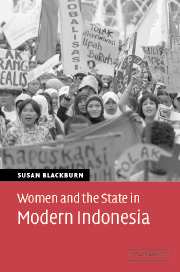Book contents
- Frontmatter
- Contents
- Acknowledgments
- Note on spelling and terminology
- Glossary: abbreviations, acronyms and Indonesian terms
- Introduction
- 1 State gender ideologies and the women's movement
- 2 Education
- 3 Early marriage
- 4 Citizenship
- 5 Polygamy
- 6 Motherhood
- 7 Economic exploitation
- 8 Violence
- Conclusion
- References
- Index
Conclusion
Published online by Cambridge University Press: 22 September 2009
- Frontmatter
- Contents
- Acknowledgments
- Note on spelling and terminology
- Glossary: abbreviations, acronyms and Indonesian terms
- Introduction
- 1 State gender ideologies and the women's movement
- 2 Education
- 3 Early marriage
- 4 Citizenship
- 5 Polygamy
- 6 Motherhood
- 7 Economic exploitation
- 8 Violence
- Conclusion
- References
- Index
Summary
From a vantage point in the early twenty-first century (January 2004 to be precise), the conclusion to this book offers a place to reflect on the past and consider the future. Two main questions will be addressed here: What lessons from the last century can be learned that are relevant for today? How is the twenty-first century likely to differ from the previous one as far as relations between Indonesian women and the state are concerned? In addition some areas that require further research will be noted.
Cutting across the thematic approach taken in most chapters, this conclusion examines the past and future through the lens of a concept basic to the study of women and of development: empowerment. It is assumed that the goal underlying the struggles of women's organisations to improve the position of women is to create an environment in which they can have more power over their own lives, to fulfil their own projects. Since women cannot really be empowered by someone else, what is meant here by ‘empowering women’ is that certain obstacles are removed from their path and they are given more encouragement to take charge of their lives. By referring to empowerment, I do not wish to imply that Indonesian women have been completely lacking in power, but rather that most groups desire more power in certain areas of their life at certain times, and some groups are obviously vulnerable.
The state in Indonesia has rarely claimed to try to empower women.
- Type
- Chapter
- Information
- Women and the State in Modern Indonesia , pp. 220 - 230Publisher: Cambridge University PressPrint publication year: 2004

